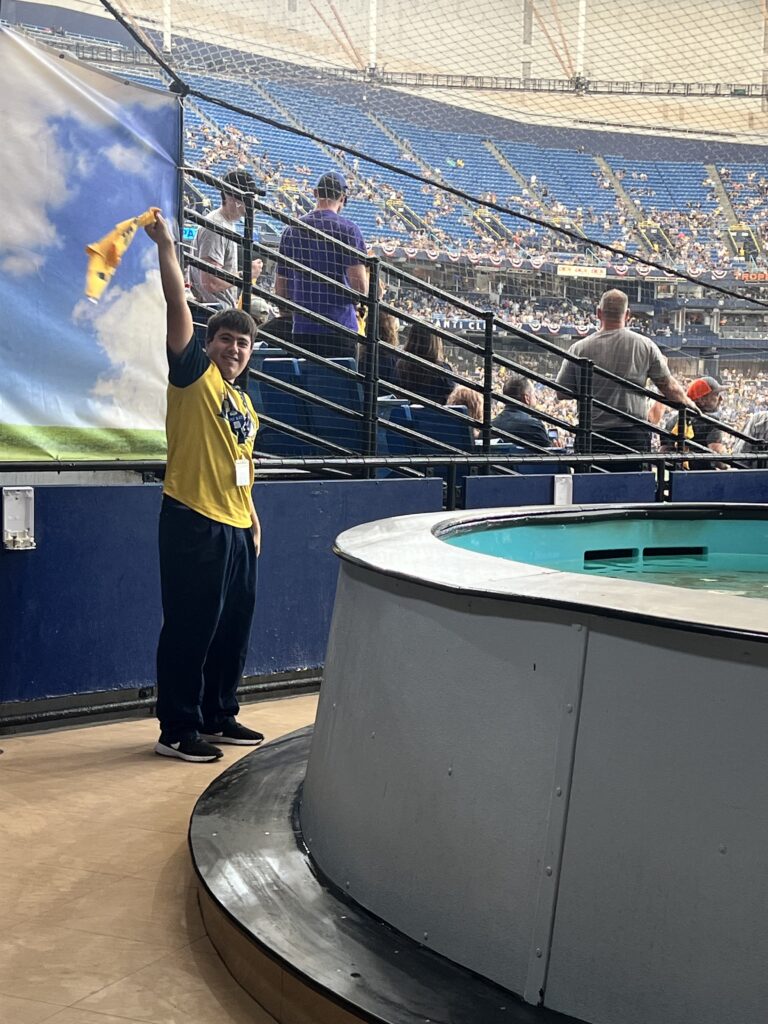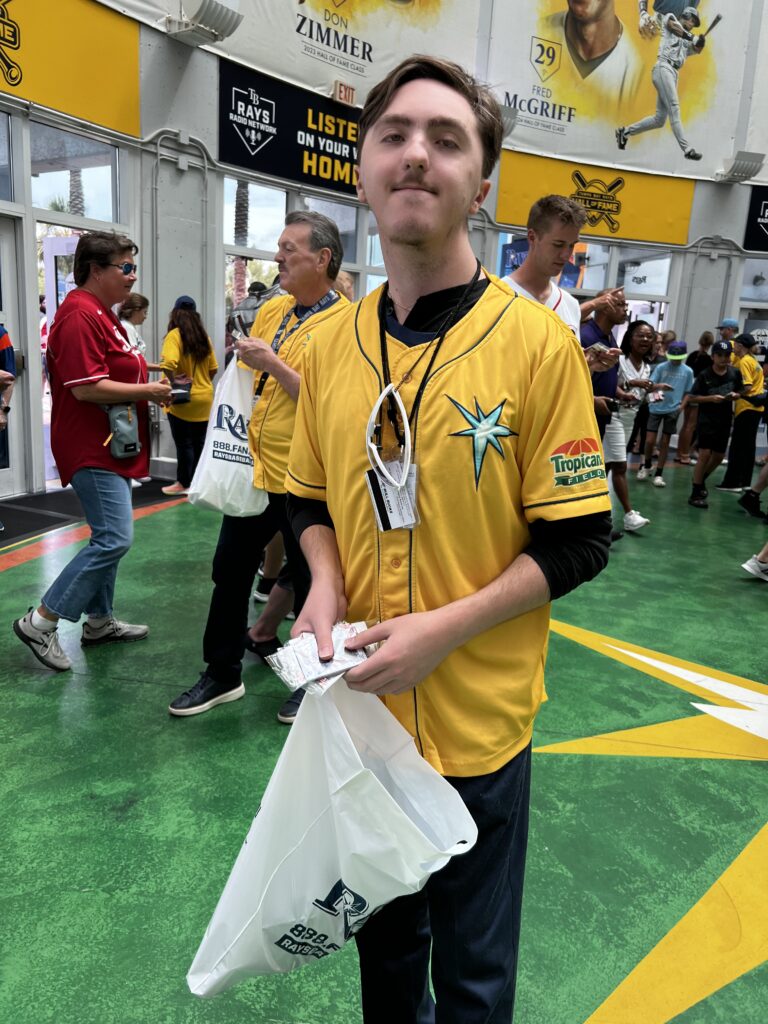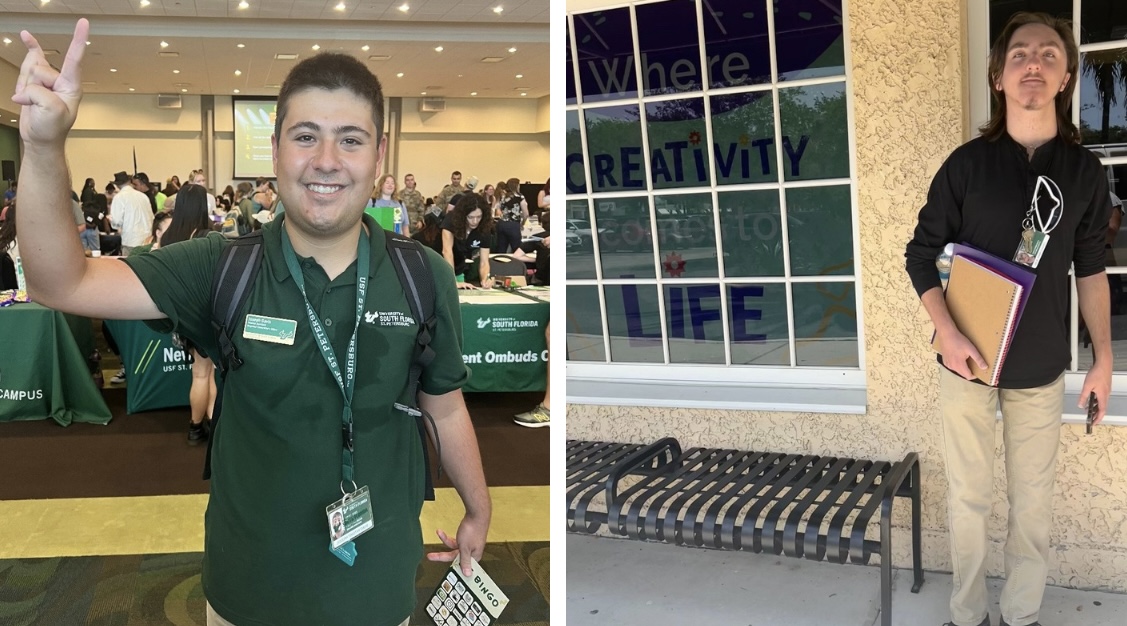Photo courtesy of Alycia Bobak.
By Dominic Feo
Working at Tropicana Field for the Tampa Bay Rays was a dream job for junior hospitality management major, Joesph Davis.
As a self-proclaimed Rays fan, Davis loved hearing the crowd cheer when first baseman Yandy Diaz slammed home runs. Getting paid to do it made the experience even better.
With Tropicana Field now roofless after damage caused by Hurricane Milton on Oct. 9, Davis, who is also a part of the UMatter program at USF St. Petersburg, does not know if he will ever get to work for the Rays again.
The Elieen Hoffman Hafer UMatter program provides support for USF students like Davis with intellectual disabilities. The program’s support helps students gain valuable work experience and participate in college life.
“It’s not only academics and employability skills, but also learning how to live independently, what it’s like to live in the dorms [and] how to take care of yourself,” said Alycia Bobak, the assistant director of academics for UMatter.
The program’s partnership with the Rays helped St. Petersburg UMatter students find jobs at Tropicana Field as fan hosts.
On the clock, Davis would lead fans to their seats and watch over the 35 foot, 10,000-gallon stingray tank, located beyond the right-center field fence.

Photo courtesy of Alycia Bobak
The stingray tank was where Davis learned “to find his voice.” Whenever fans touched the sting rays incorrectly, it was his job to help them approach the animals in a safe manner.
Bobak watched Davis learn to speak up in real time.
“I got to kind of stand back a little bit and watch him very quietly, first tell a family, like only two fingers, not a whole hand… it was really neat to see him vocalize that even louder in a very professional manner, she said.
Davis nor anyone could have prepared for Hurricane Milton’s impacts which ripped through Tropicana Field’s translucent fiberglass roof.
Before the storm, there was an agreement in place for a $6.5 billion project that would have involved building a new stadium and redeveloping the surrounding Historic Gas Plant District.
Since then, the city of St. Petersburg, and the Rays have been unable to make a long-term decision on the future of the team and its stadium.
On Nov. 21, the St. Petersburg city council voted to spend over $23 million dollars to repair Tropicana Field. The decision would be reversed a few hours later.
Until repairs are made, the Rays will play at George M. Steinbrenner Field in Tampa, Florida. The stadium is known for hosting the New York Yankees’ spring training.
While the Rays want the Trop to be reopened by 2026, acquiring the required funds will come down to the approval of at least one of the council’s two newest members, Mike Harting and Corey Givens Jr. That decision will have to be made by late March if the Rays want any hope of playing in St. Petersburg by 2026.
If the 2026 deadline is not met, the Rays may begin looking for a new home, leaving the UMatter students who have worked there unemployed.
Once Davis learned that he would have to find a new job, he was devastated.
“The staff informed me that I wasn’t going to be working there – I felt sad and upset,” Davis said.
Sophomore, Jack Sampugnaro, is another UMatter student and former Rays employee that was shocked when he first saw the damage done to the Tropicana Field.
“It was heartbreaking, I thought it was very shocking, I didn’t expect that to happen,” said Sampugnaro.

Photo courtesy of Alycia Bobak
While Sampugnaro furthered his studies in computer programming, he took shifts at Tropicana Field. He would greet fans while he gave out rally towels, bobbleheads and baseball cards.
He felt that the Rays organization treated him like family.
“I got right into it, and I enjoyed it, they were so nice to me, and they were always supportive to me, they were very helpful if I need anything,” he said.
The kindness shown by the Rays staff empowered Sampugnaro to be himself.
“When Jack first came in, he was a little bit more shy, and he has certainly blossomed out of his shell,” Bobak said.
Bobak knows that job options for students like Sampugnaro can be limited due to stigmas that surround people with intellectual disabilities.
“It’s hard to [get hired], employers find it difficult to hire students with a disability,” she said.
A study done in 2022, by the National Core Indicators – Intellectual and Developmental Disabilities (NCI®-IDD) found that 84 percent of people with an intellectual disability did not have a job in their own community.
The Rays leaving St. Petersburg would be another heavy loss for a community of people who already struggle to feel accepted in their workplace.
Despite the lack of inclusive jobs for intellectually disabled people, Bobak believes that the Rays were a model example.
“I can say that they are inclusive, but there’s more than that, they go above and beyond,” she said.
In 2023, the Rays won the Inclusive Employer Award from the Florida Center for Students with Unique Abilities (FCSUA) for their partnership with the UMatter program.
Although his future with the team remains unknown, Sampugnaro is hopeful that the Rays work in the city is not yet finished.



